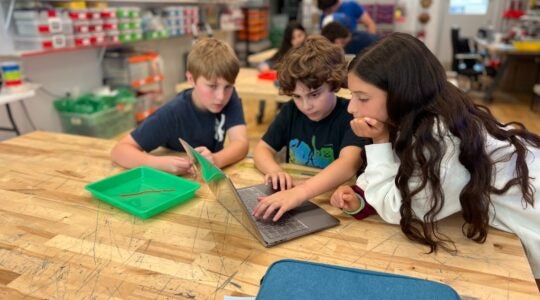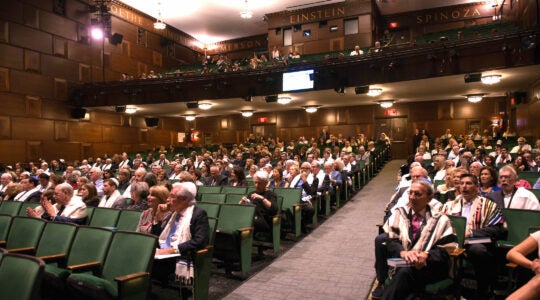The strong bond between Pope Francis and longtime friend
Rabbi Abraham Skorka of Buenos Aires is such that when the pope hosted the rabbi in Rome in September he made sure the rabbi was housed within walking distance of a synagogue, had kosher food, wine and challah.
And as he sat down to dinner next to Pope Francis at the start of the Jewish holiday of Shemini Atzeret, Rabbi Skorka told him, “I have to say Kiddush, it’s a holy day.”
“Say Kiddush, no problem,” the pope replied.
With that, Rabbi Skorka recounted for congregants last week at the Shelter Rock Jewish Center in Roslyn, L.I., he recited Kiddush and the pope and four or five other guests at the table replied, “Amen.”
Rabbi Skorka, 63, rector of the Latin American Rabbinic Seminary, added that the “Italian kosher wine was wonderful.”
At the end of the dinner, a cake the pope had received as a gift was brought out.
“He shared it with people at the table and said to me, ‘I’m not going to give you cake because I’m not sure what’s in it.’ I said you have a rabbinic way of thinking – when you have a doubt about it, it’s not kosher.”
Rabbi Skorka was on Long Island at the end of a two-week speaking tour arranged by Masorti Olami, the Conservative movement in Latin America, Europe, Asia, Africa, the former Soviet Union and Australia.
He said that while in Rome he stayed in an apartment at the Casa Santa Marta, the Vatican guesthouse where the pope has also made his home alongside other priests and bishops rather than in the papal apartments. The rabbi said Pope Francis selected the apartment for him so that he would be within walking distance of a synagogue because his visit spanned two Jewish holidays and Shabbat.
As Rabbi Skorka spoke it was clear that the two men have what he termed a “friendship that is very special.” They have known each other since 1997, when the pope, then known as Jorge Mario Bergoglio, became coadjutor bishop of the Buenos Aires archdiocese. And since Cardinal Bergoglio became pope, Rabbi Skorka has been referred to affectionately as the Pope’s rabbi.
“For me, that title means that I have built up a special message with him through the book we wrote together [in 2010 called “On Heaven and Earth”] and the 30 programs we did together on Argentinian television,” he told The Jewish Week. “Each of those programs discussed a burning problem in Argentine society.”
In those discussions, Rabbi Skorka said he and the pope agreed on the core issues but still had their differences.
“Catholicism is extreme, halacha [Jewish law] is more dynamic,” he said.
Thus on the issue of abortion, the Catholic Church flatly rules it out. Judaism, on the other hand, allows for it under certain circumstances, such as saving the life of the mother, Rabbi Skorka explained.
“But of course both of our religions have the same ultimate base — the Hebrew Bible.”
In their book, Rabbi Skorka said the two “analyzed and commented and tried to understand together. We did not enter into debates that don’t have a certain purpose — our position is our position and the Christian position is theirs. We can dialogue, not debate because we’d be debating about values and it’s impossible to give a logical reason to values; it’s a matter of faith. You understand it one way, I another. The idea is to sit around a table and try to understand and learn one from the other. To try to convince the other is not our way of dialogue. … We are analyzing [an issue] but with a great sense of respect.”
Asked about the symbolic changes Pope Francis has made in the church since his election, Rabbi Skorka recalled telling him “at the beginning of our relationship what great courage he had for the things he said in his homilies. … He used to criticize a society that suffers social injustice. Newspapers explained his words as political, but I said he was not speaking that way. In the end, it provoked a break between him and the government of Nestor Kirchner.”
He noted that Kirchner’s wife, Cristina, who succeeded her husband as president of Argentina, continued the rift by bypassing Bergoglio’s cathedral to visit another for the commemoration of Argentina’s liberation.
“He has his way,” the rabbi said of Pope Francis, “and he will not depart from it. He’s a strong, stubborn man in the sense that he will not depart from what he considers justice, from his fight for the poor, and his ideals.”
Will he go beyond symbolic change and change the dynamics of the Catholic Church?
“I don’t know,” Rabbi Skorka said simply.
Asked how the papacy has affected his friend, the rabbi replied: “Last year I saw him so tired and with a lack of power. Now I see him revitalized and in power.”
In their book, Bergoglio called for the opening of the Vatican archives to learn the true role Pope Pius XII played during the Holocaust.
“They should open them and clarify everything,” Bergoglio said in the book. “Then it can be seen if they could have done something, to what extent it could have been done, and if we were wrong in something we will be able to say: ‘We were wrong in this.’ We do not have to be afraid of that. The objective has to be the truth.”
Rabbi Skorka said he is confident that Pope Francis will move to do this.
As evidence of that, Rabbi Skorka pointed out that Pope Francis announced in July that Popes John Paul II and John XXIII would be declared saints next April “but he said nothing about Pius XII.”
Asked about the timing of any announcement about the Vatican archives, Rabbi Skorka pointed out that although Pope Francis is the head of state, “he has a cabinet” with which such things must be discussed.
“For sure he will not impose a decision on such a sensitive question.”
Rabbi Skorka said he plans to accompany the pope during his first visit to Israel sometime next year; no date has been set. He said he does not know the itinerary but that he would like them both to visit the Western Wall “to pray together and say that it brings an end to 2,000 years of non-understanding.”
And he said he would like to join the pope for a visit to Bethlehem “not to pray there but to be alongside my friend in such a spiritual moment for him as a sign of respect and love.”
Regarding Pope Francis’ relationship with the Jewish community, Rabbi Skorka said he has a “special relationship towards Jews and Jewishness. He took Nostra Aetate [the declaration of the Second Vatican Council in 1965] as the basis of his own approach to Jews. It’s a very strong statement that says God did not reject the covenant with Jews and that we are not guilty of God’s killing — we are not a deicide people.
“From a theological point of view, according to what I spoke with him about, he and other important Catholic thinkers believe in cooperation between Jews and Christians in order to get a better world — respecting one another and sharing the challenge to bring more spirituality and justice to the world. This is the way to pave the way to redeem the world. … Each one of us has a mission in God’s plan.”
The New York Jewish Week brings you the stories behind the headlines, keeping you connected to Jewish life in New York. Help sustain the reporting you trust by donating today.




